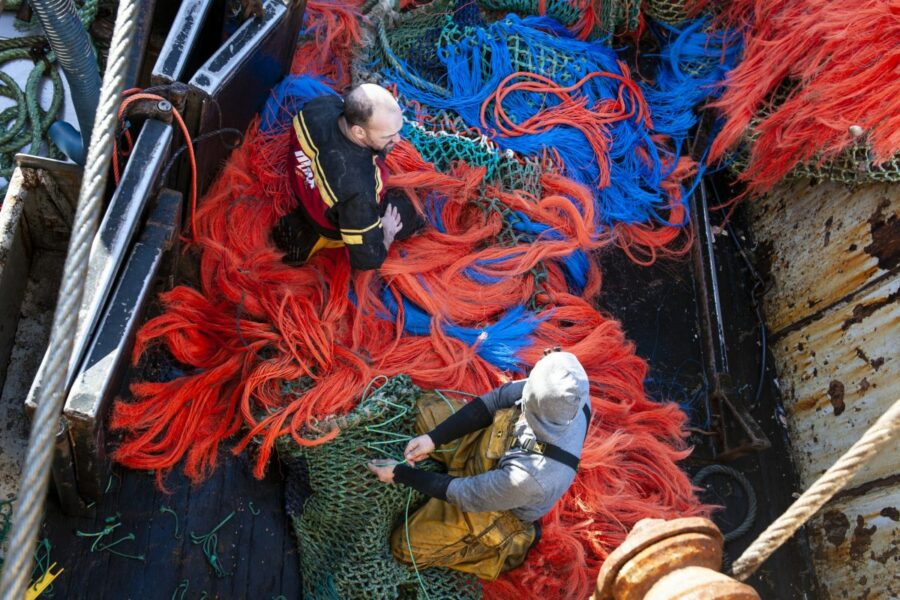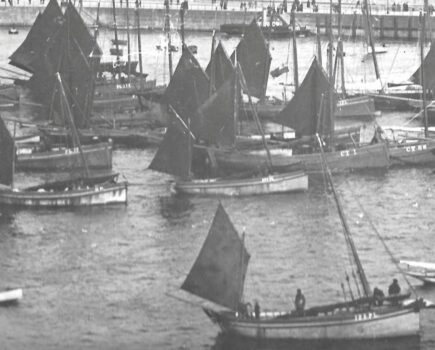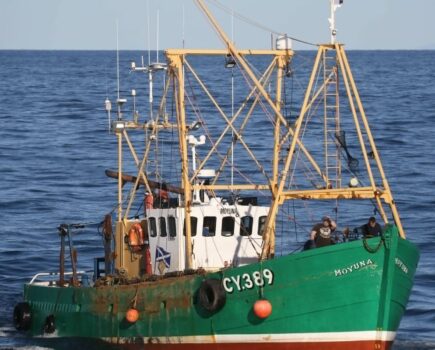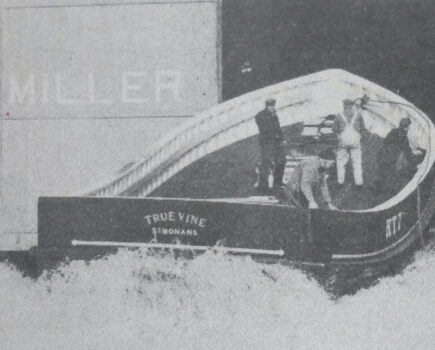Photographer Tony Fitzsimmons records observations and conversations from a stormy January trip on the beam trawler Julie of Ladram
Following my week at sea onboard the Waterdance vessel Sam of Ladram, next up on my list was the Julie of Ladram E 271.
The Julie is the largest boat in the Waterdance fleet, with an LOA of 38.25m and a sizeable beam of 8m. She was built at the Haak shipyard in Zaandam, Holland in 1983, fishing in and around the North Sea under the name Cornelis Maria for many years. Waterdance renamed the vessel Julie of Ladram in honour of the much-missed administrator of its parent company Greendale, Julie Jones, who passed away in 2018.

Mate Sprat and deckhand Ray repair the nets ahead of another trip on the Julie of Ladram.
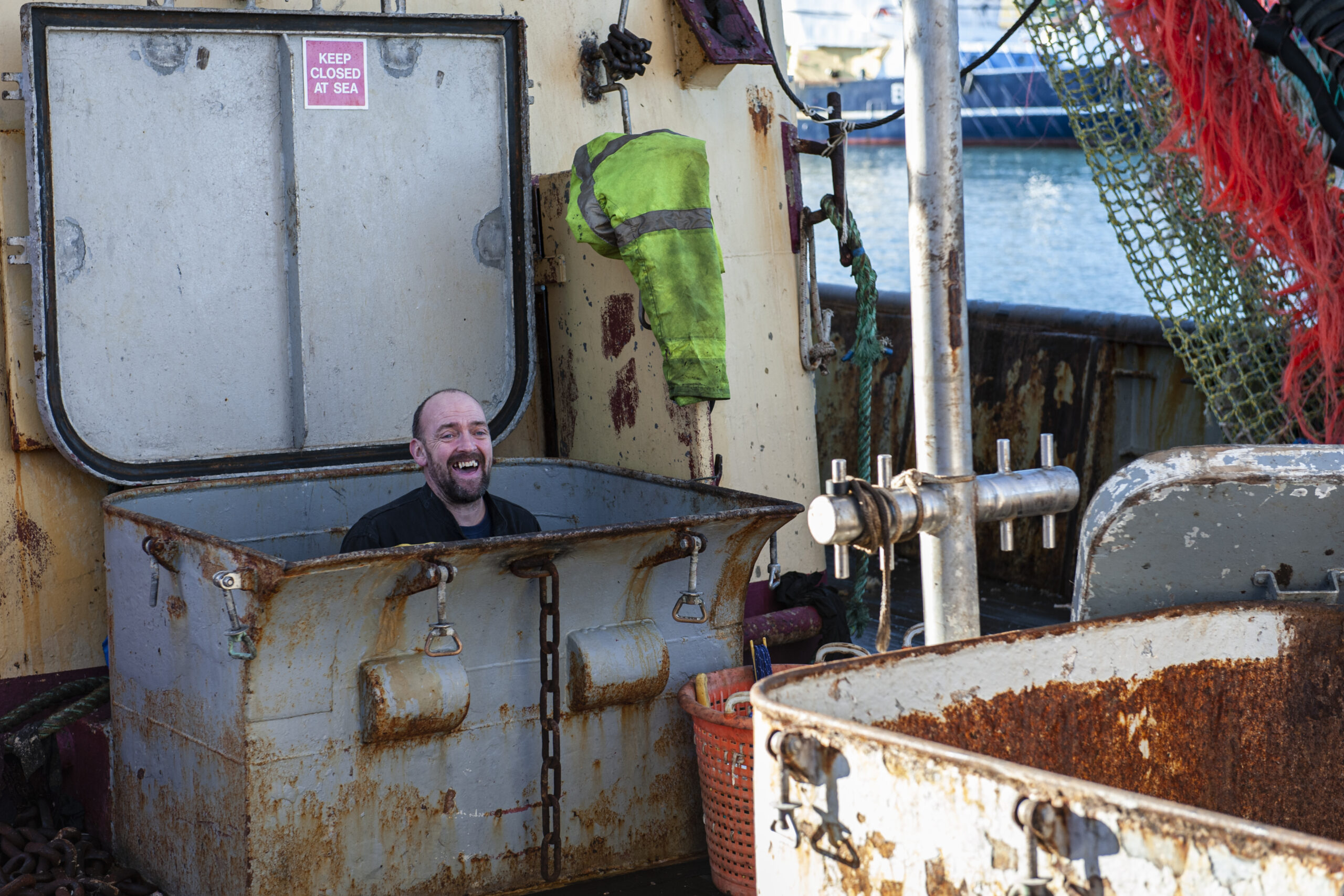
Sprat is caught doing his finest Whac-a-Mole impersonation.
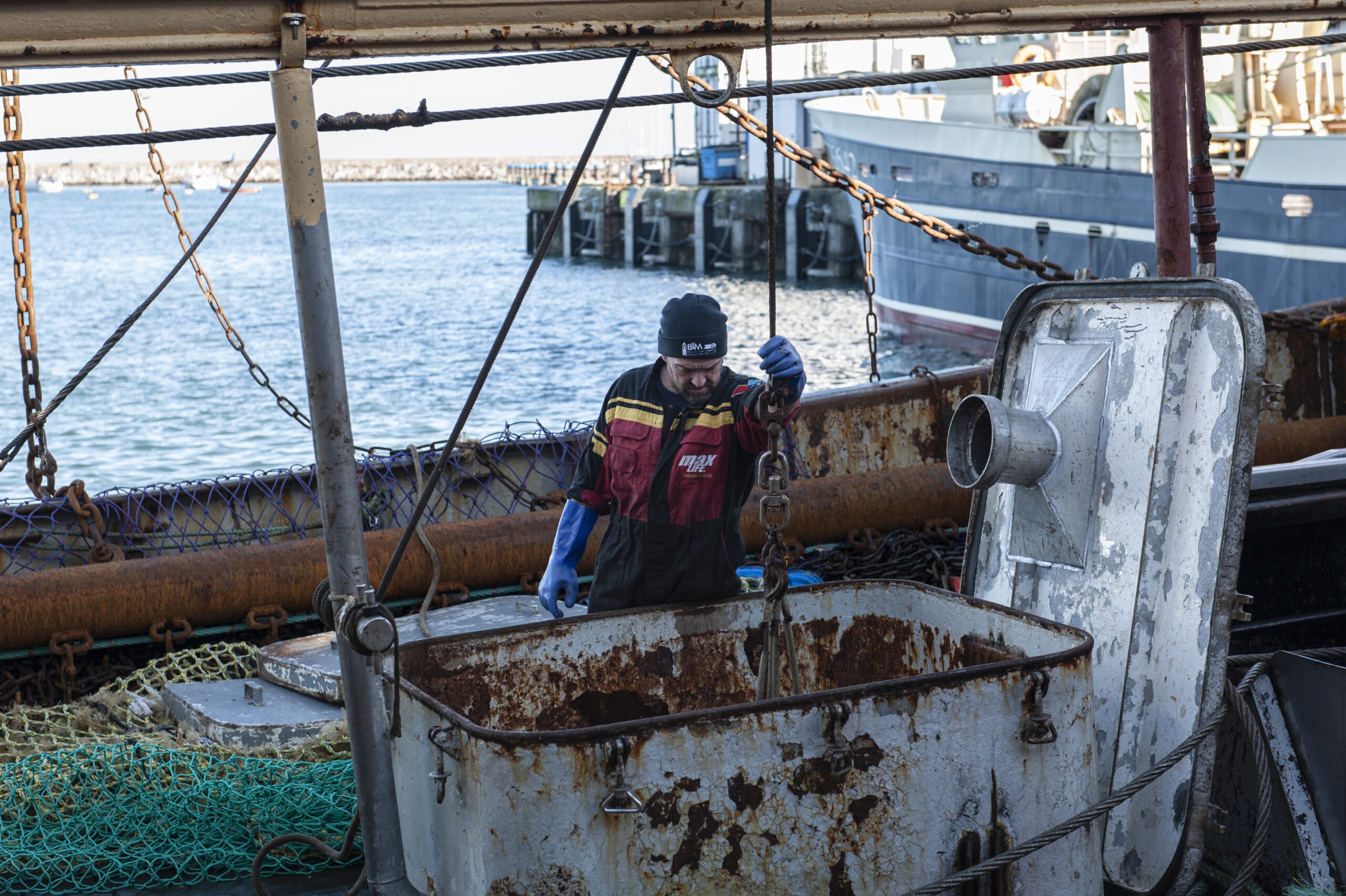
Back in Brixham, Sprat begins landing the catch.
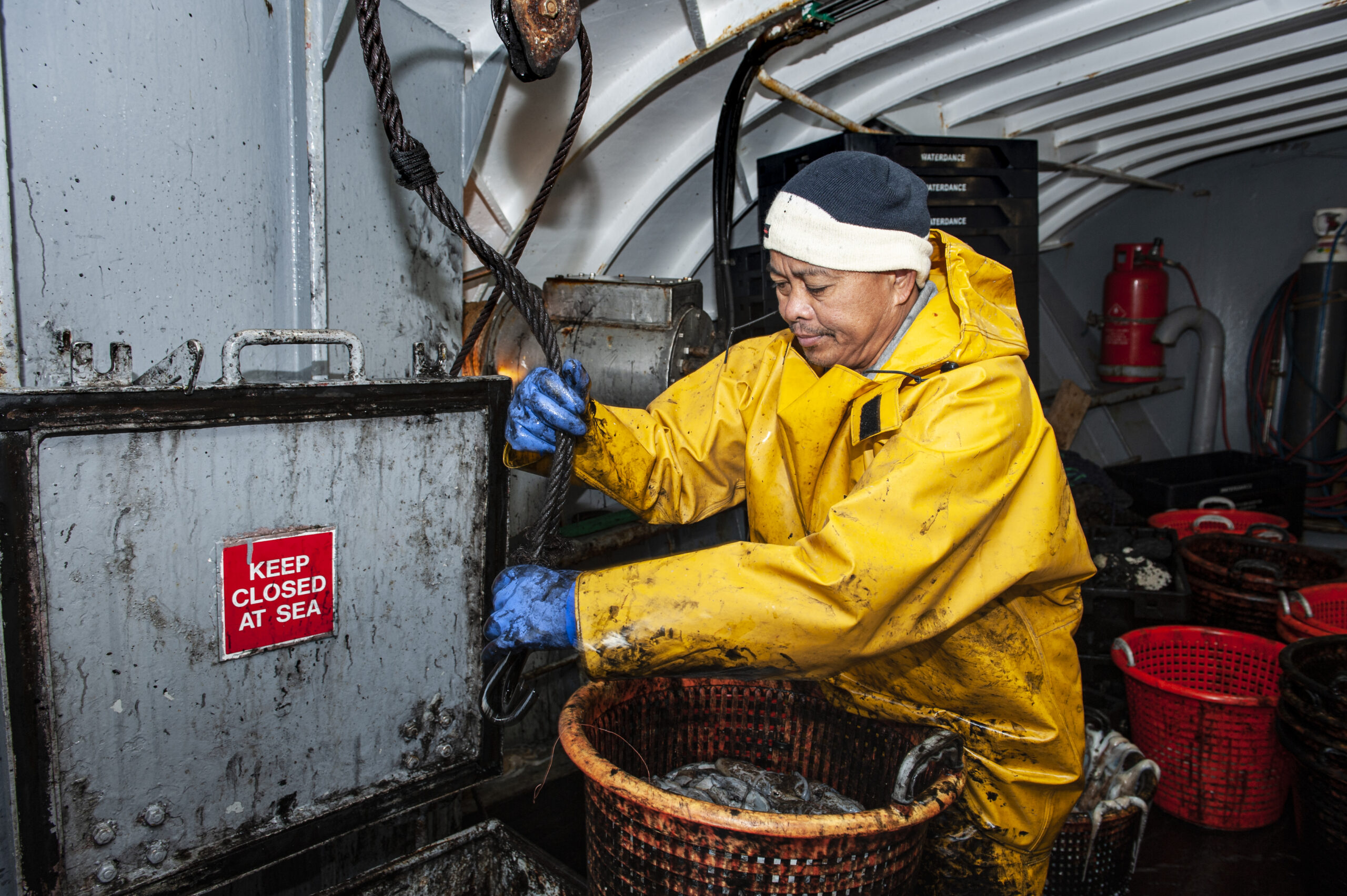
… and lowers another basket of cuttles.
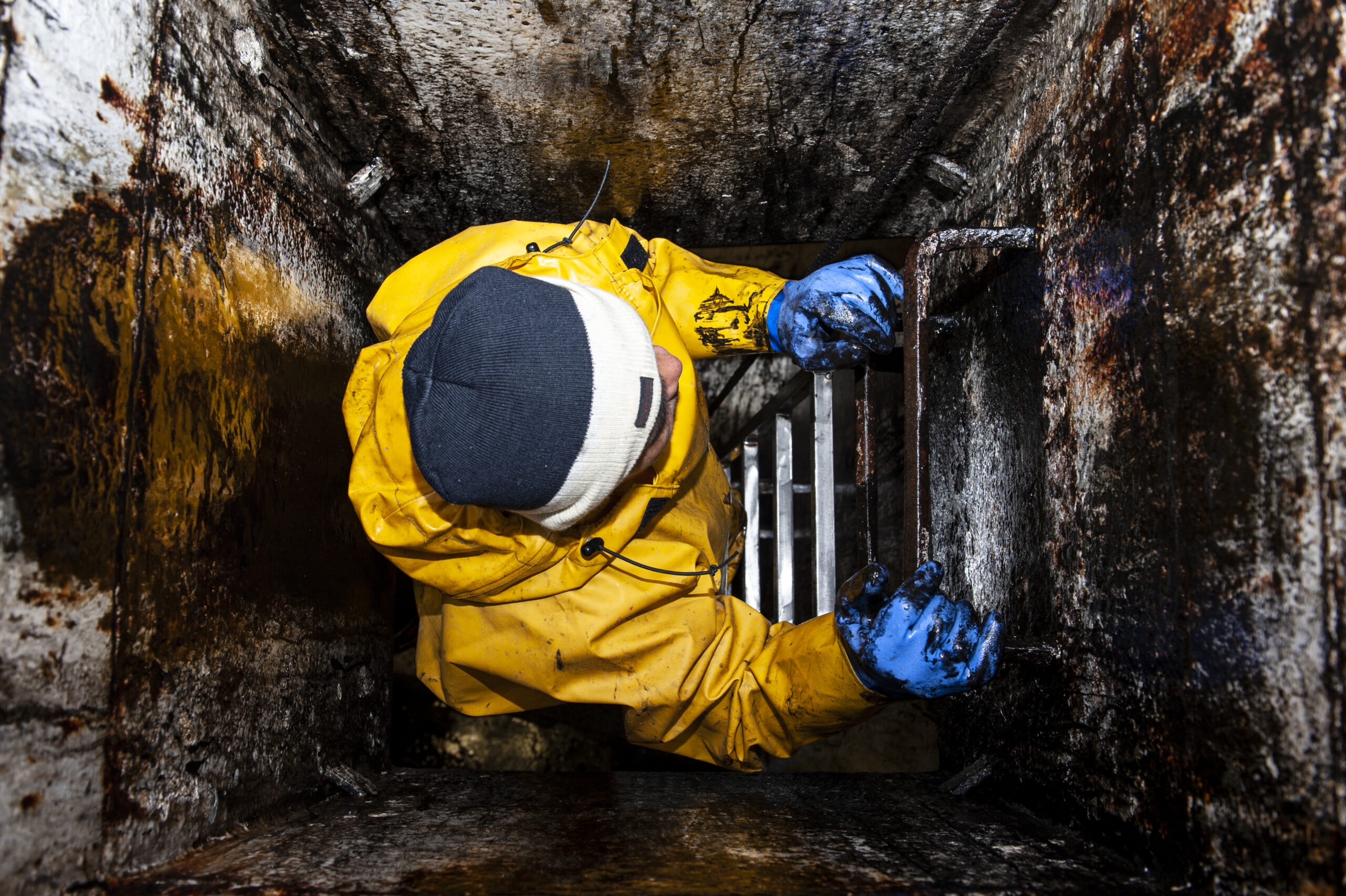
Ray climbs out of the fishroom…
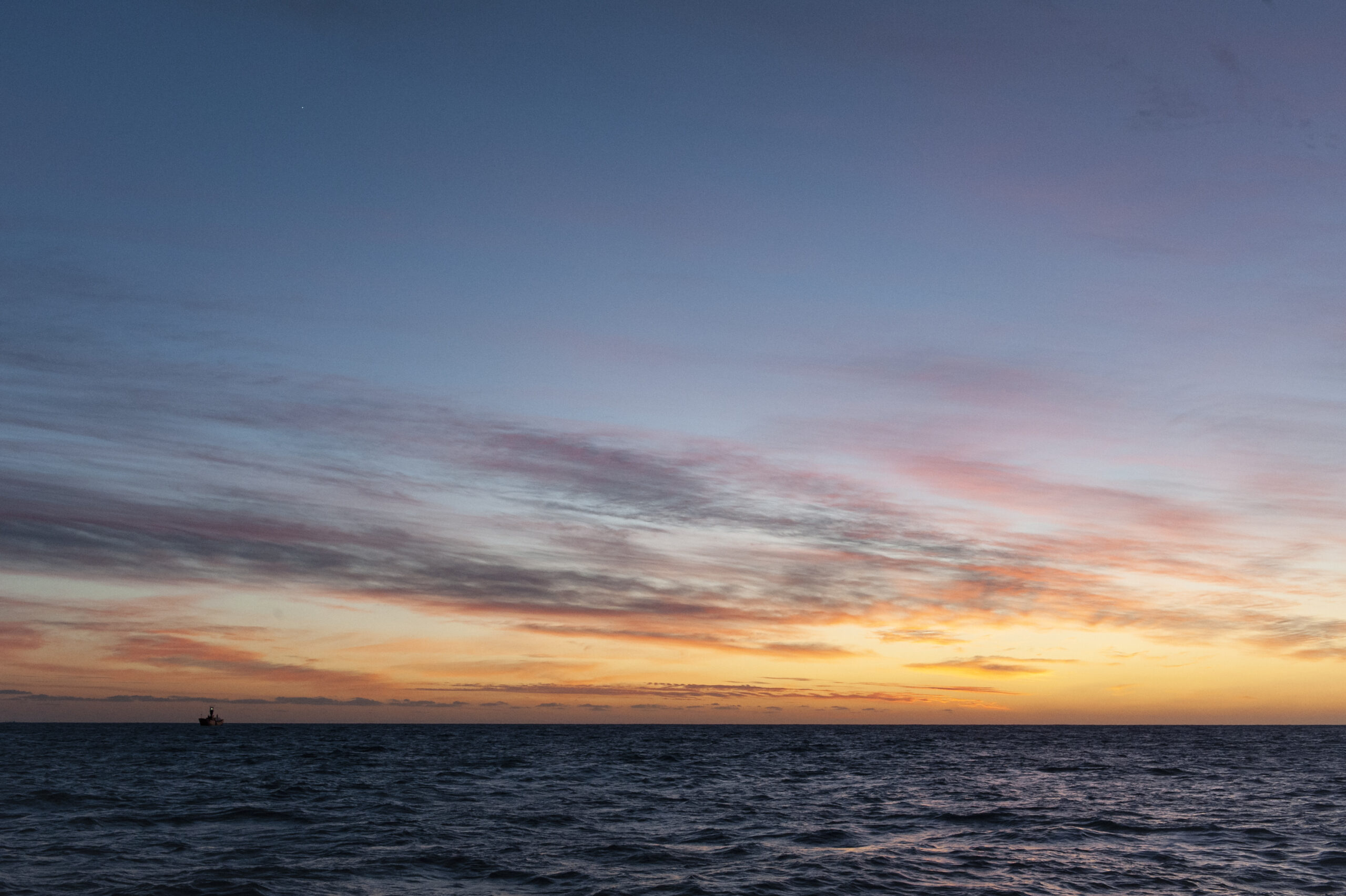
The Channel Light Vessel under a lovely January sunset.
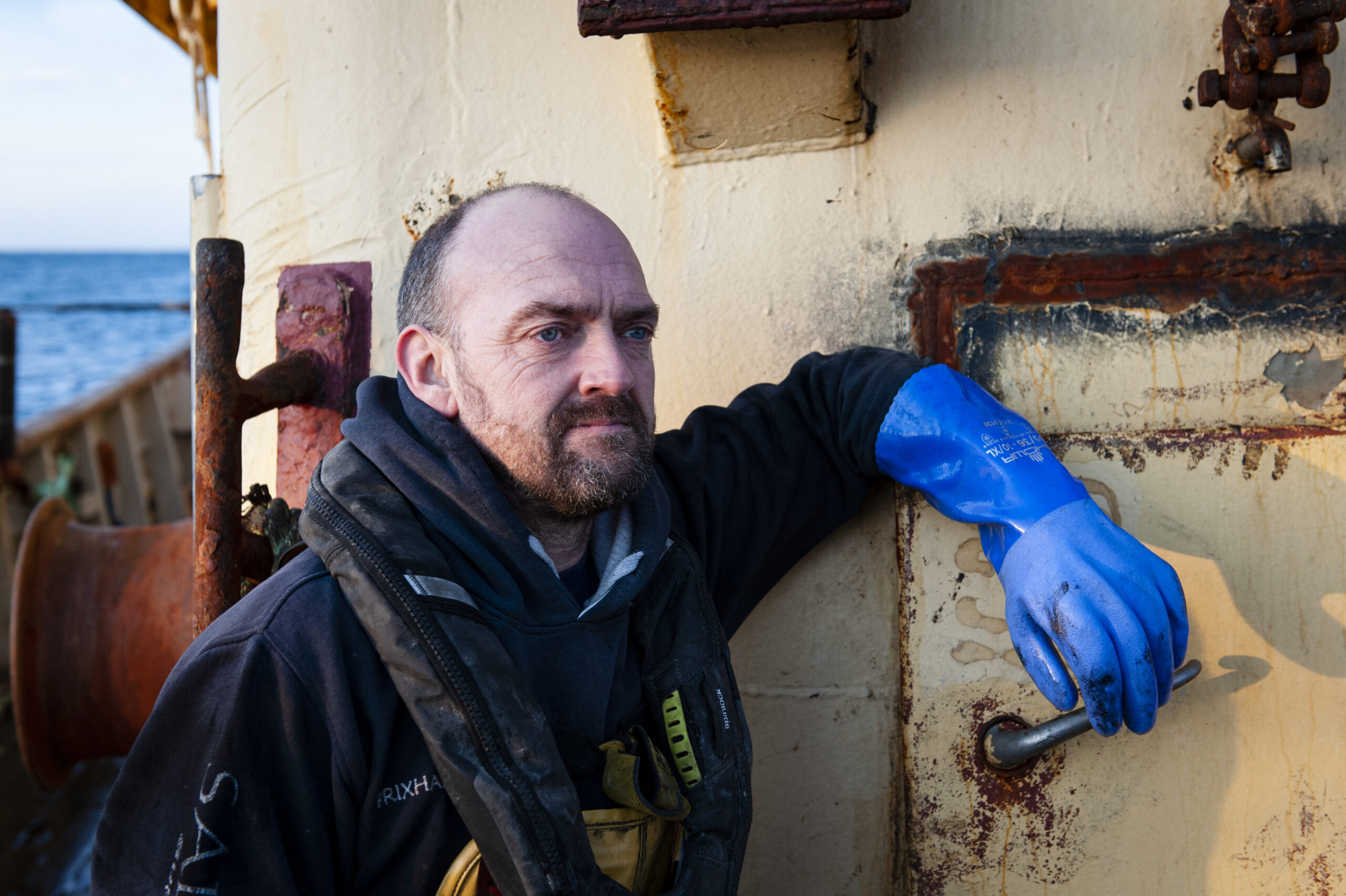
Sprat enjoying a little sun on deck after the storm subsides.
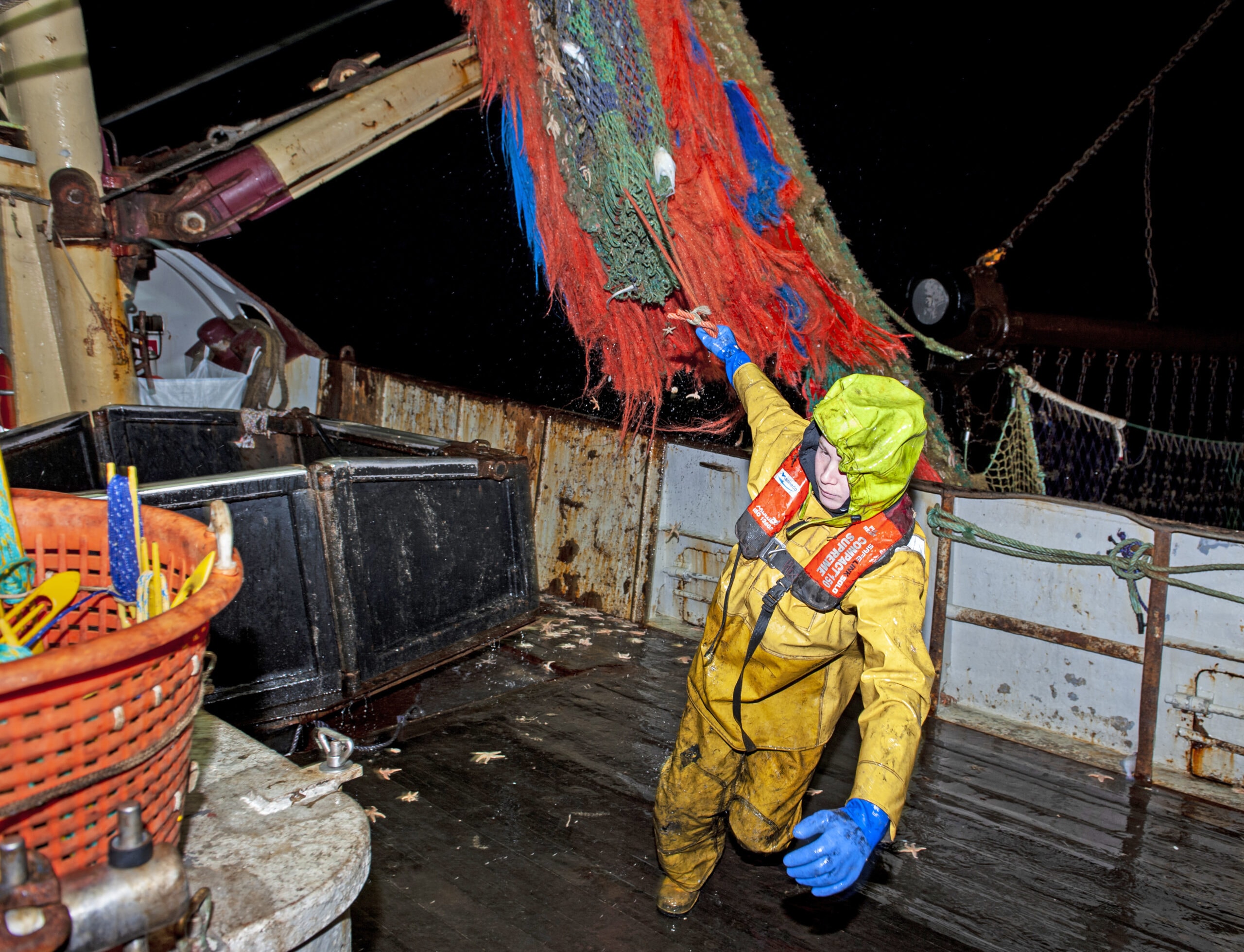
… and brings in another late-night haul.
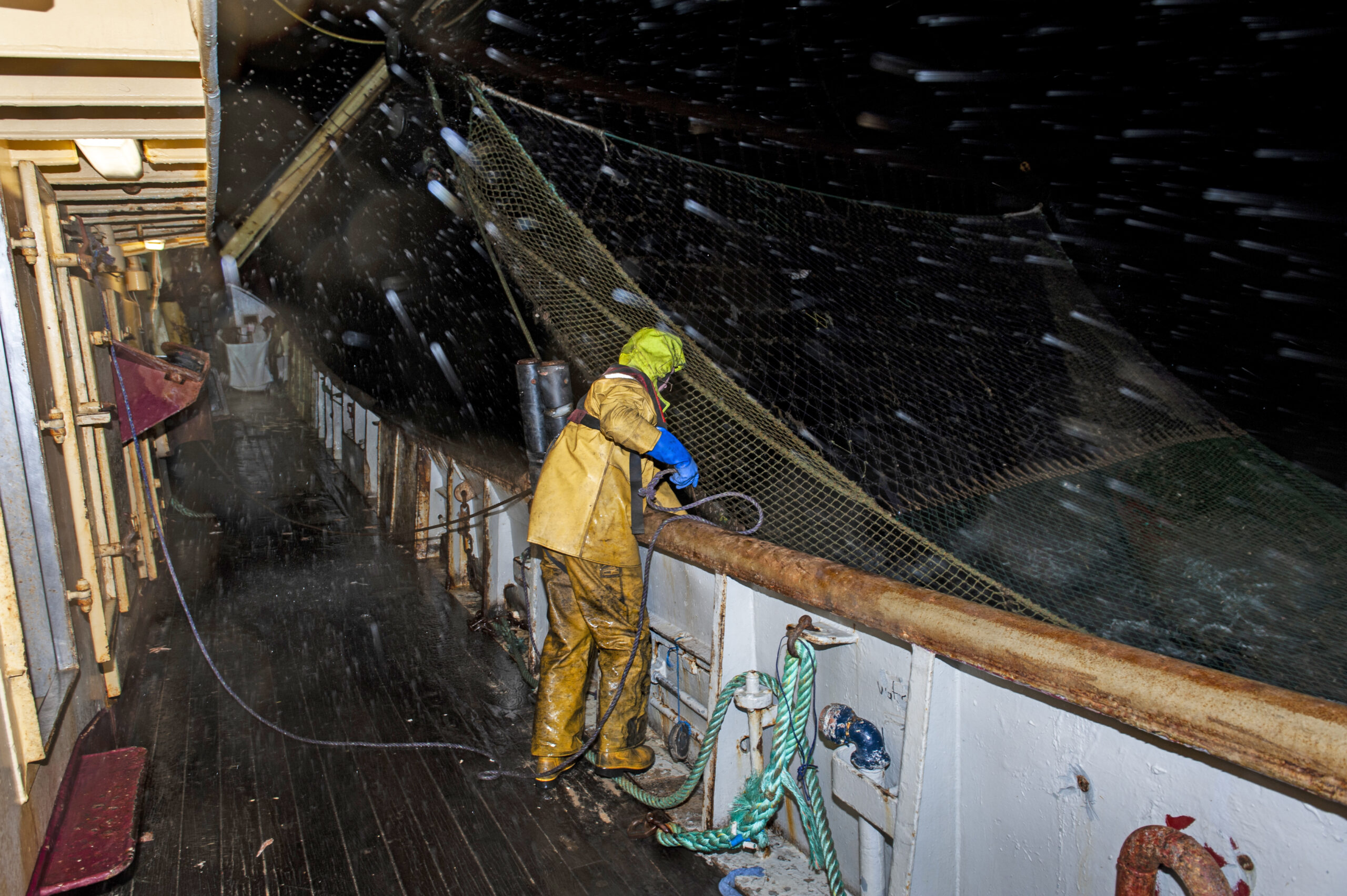
Marley checks the starboard net as Storm Brendan rages…
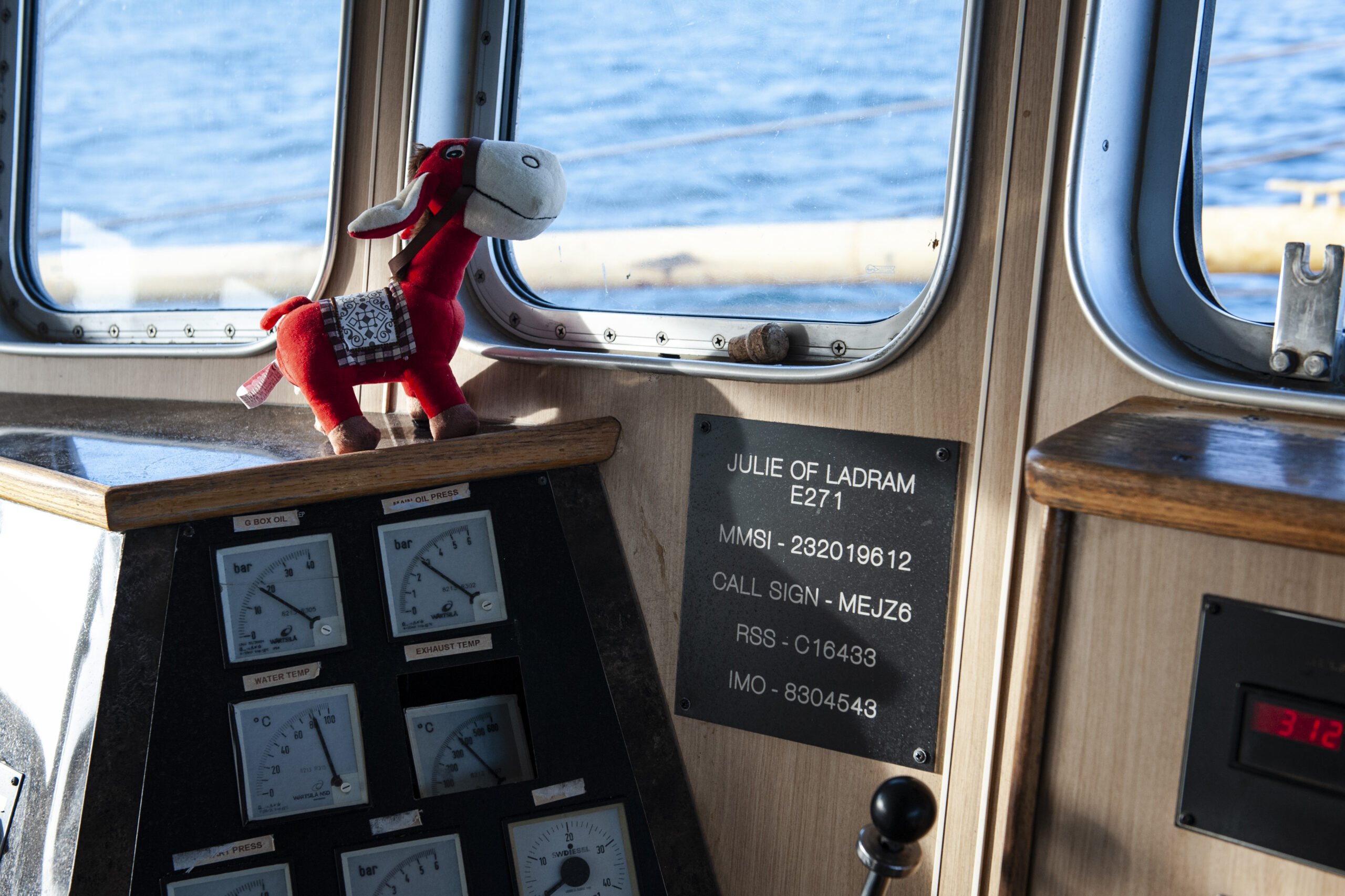
The mascot for the Julie keeps watch in the wheelhouse.
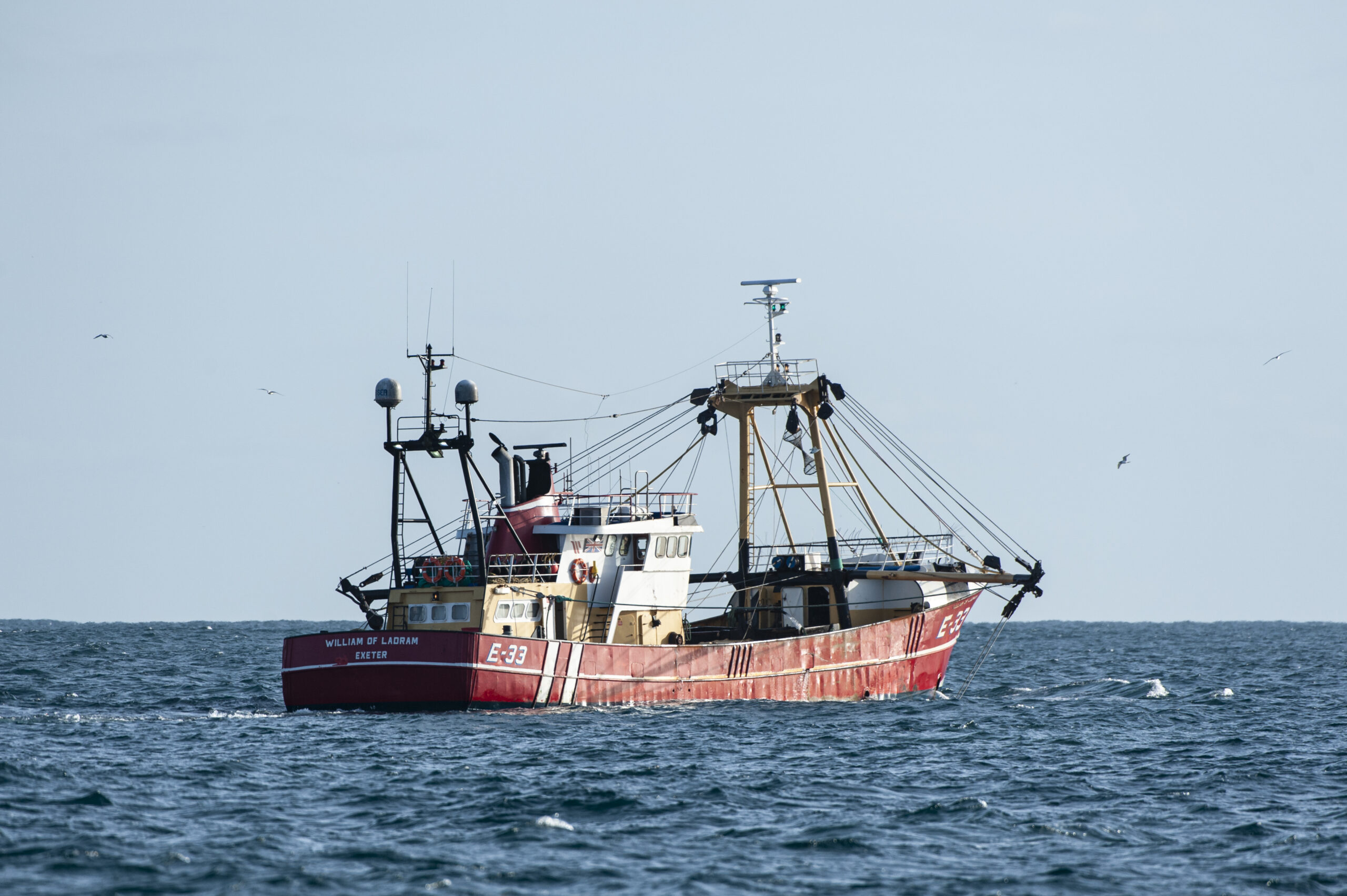
The Waterdance vessel William of Ladram begins fishing operations close to the Julie.

Easterly winds and swells batter the Julie.
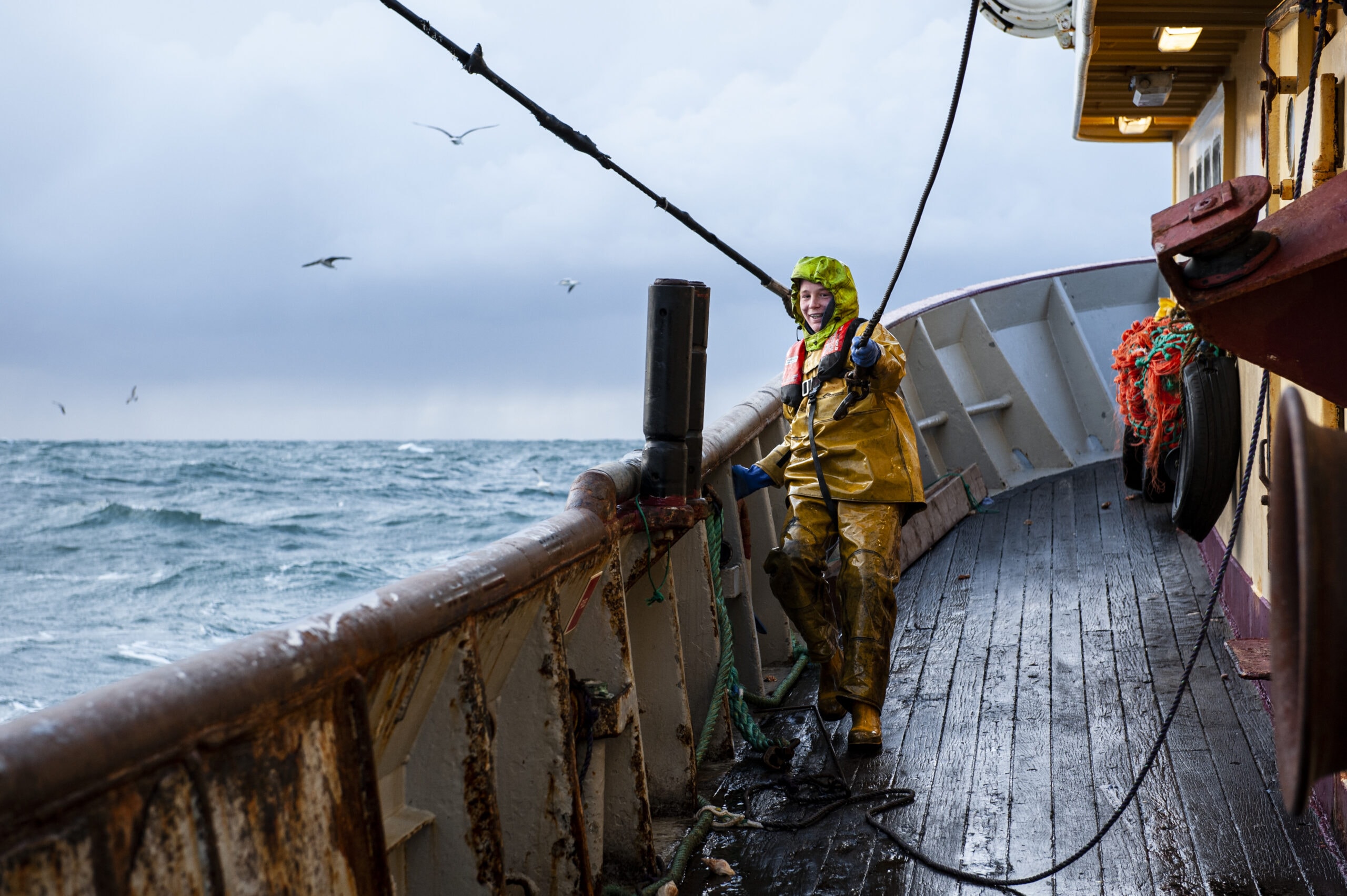
Marley Tyler prepares to bring in the starboard net.
Julie of Ladram is quite the stunner: long, wide, and with a generous stern and substantial deck that would allow for plenty of action shots, without me being in the way of the deckhands during a haul.
As I arrived in Brixham just after midday, the crew were busy sorting nets, and I headed to the galley to meet skipper Sean Beck. He was only there to see the crew off, with this week and the next marked down as a well-earned break. Taking the helm for this trip was Nathan Marshall, a 34-year-old fisherman with 13 years’ experience and an evident passion for the sea.
Nathan’s mate for this trip was Mike Smith, a fisherman of 35 years’ standing. He went by the name Sprat, and I really had to know why. “I was born in August,” he said. “My dad and grandad were fishing for sprats, and when I was born and he first saw me, he said, ‘He ain’t no bigger than a sprat,’ and it stuck from that. School teachers called it me, everybody called it me.” I asked Mike how tall he was. “Five foot six. I never quite made it to 6ft!”
I was met with a familiar face from my time onboard the William of Ladram during Storm Doris in January 2017: Lien ‘Numpty’ Rogers, now sporting a full beard, causing a double-take moment until I heard his very familiar voice. Now 31 and with 10 years as a fisherman under his belt, this was his second week onboard the Julie as cook.
The two Filipinos onboard were Danny and Ray, long-time friends who had known each other for much of their lives. Danny was also married to Ray’s niece. Danny, aged 38, had been a fisherman for 15 years, nine of those spent fishing out of Scotland, with this his first year in the South West. Ray, now 50, had also been a fisherman for 15 years. He would shortly return to the Philippines for a hard-earned break, to spend a few months with his wife and their son and daughter, while Danny, having recently had his holiday with his wife and two girls, was now back at work for the long haul.
Marley Tyler, last but by no means least, was just 17 years old, by far the youngest and also the most enthusiastic fisherman I had ever come across since I began documenting lives and livelihoods at sea. Marley is tutored and mentored by both Nathan and Sean, but despite this being only his fourth month as a fisherman, nothing about him suggested anything but a seasoned pro. His baby-faced exterior masked the much older and wiser head on his shoulders, and an early interest in the engineroom had quickly seen Waterdance put him through a shoreside engineering course. His knowledge of the inner workings of the Julie was very much on show over the week. Marley was a credit not only to his parents and Waterdance, but to the UK fishing industry, and if our UK vessels each had a Marley on them, the future of our industry would be bright indeed.
With evening approaching, we left Brixham harbour and immediately headed towards Longbank. Despite the early appearance of calm, the sea state ramped up considerably just a few miles out of port, and I decided to go with just a bowl of rice and a popadom before bunking down, ready for a sunrise start the following morning.
Sadly, when I woke early the next day, conditions had worsened, and all that day I was plagued by an uneasy feeling any time I caught glimpse of the tempest outside. With the lads coming back in off the deck in early afternoon, and cooked snacks prepped as deckhands switched over, the hustle and bustle and constant motion just added to the overwhelming sense that any time soon, I would throw up. With this being a shorter trip, achieving what I had been tasked to do was going to be a tricky affair.
For much of the rest of the day, the Julie was peppered with strong swells and swirling winds. I managed to get some shots of the deckhands hard at work with my camera wrapped in a thin waterproof wrap, but at times it was all just too much and I retreated to lie on my bunk. Forty-three years on the planet, and I have yet to entertain a worse feeling than seasickness.
I did what I could that evening, though the first day had largely been a write-off. Still, I plodded on with one last night shoot before turning in, as Danny and Ray took to the deck, the wind and rain continuing to pelt down.
My night was restless; every time I drifted off, I was immediately smacked back wide awake by an unpalatable mixture of noise and erratic movement. My death-warmed-up exterior spoke volumes to those in the galley as another day of easterly winds began – the only good news being that the following day was due to be much kinder.
Again I did what I could out on deck against the dramatics, and when the lads were inside, I occupied my time and theirs with a series of questions. As I collared Nathan in the wheelhouse, the first topic was Brexit – and he was not enthusiastic.
“We were doing really well. I don’t think the boats have ever done so well. We had the markets all set up, the exports all set up, and they will completely destroy all that for months, until they set it all back up again. We may even take a hit financially. We were never going to get our waters back, and if we did, we are in French waters a lot of the time, so we won’t be allowed in there.
“To be honest, I would have sooner stayed in the EU. I do think I’ve never done so well. Many others have never done so well, so why change it? They may not negotiate very well and just completely screw us over, as a bargaining chip for something else.”
Sprat disagreed, seeing a much more positive outlook for the industry. “Prior to Brexit, it was looking not great, but I think if we do get half of what was promised, then we will…” – he paused for a moment – “… not win, we are never going to win, but we will get a lot more than we did have. It’s not so much about getting our waters back. Water’s water.
“It’s more about the quota, and we can have what we like then. And if it’s too much for us, that’s great, we can dish it out and gain revenue through that. It can go back into the fishing industry, for youngsters, for whatever reason, for training, tickets, whatever. So hopefully it will go in the right direction. It can only go forwards, although it is going to be used as a bargaining chip. We know that, we knew that from the offset, but it’s going in the right way.”
Lien’s words echoed these feelings. “Not that I really understand it all as a deckhand, but it seems a lot of foreign boats have got a lot of our quota. I think it is all right for them to fish here, but why have they got more percentage in our water? How is that fair?”
The topic of climate change was next on the list, as cantankerous swells continued to hit the Julie hard. Nathan said: “The summers are hotter, and they are stuffier at sea. Calmer weather, weeks and weeks of flat calm, and then in winter it can be 10s, 10s, 10s! It’s just more severe. You notice a change in the seasons a lot more, definitely.”
“There has been a change in water temperature,” Sprat added. “That’s obvious, because of the different species you see. Sometimes you might even see something exotic – only the odd one. You might see a scorpionfish, and you wouldn’t have seen them years ago. Anchovies, they are here in the upper channels, so the water is obviously warmer, as they are traditionally a Mediterranean fish.”
With the storm season kicking off and Brendan clearly annoying everyone onboard, I wondered what to expect from the long list of storm names to come, with Ciara up next. Right then it certainly did feel worse – but then I’m only at sea every so often, with seasickness adding weight to my opinion.
Mentioning my unease about the large supertrawler in the Channel late last year, I asked Sprat about sustainability. “It’s managed now way better than it ever used to be. You have an e-log that is done every 24 hours, they know what you’ve caught, and you are monitored when you get in. I imagine there is still black fishing that goes on, there is bound to be, but it is not as bad as it was, so going forward, that’s massive, that’s really good.
“We don’t, as fishermen, want to kill everything. Why would we? We don’t do that because what are we going to catch tomorrow? What’s going to feed our grandkids, what are they going to do? How is Brixham ever going to sustain itself if we catch all the fish? We have a quota. If we catch up to it, we don’t fish any more, that’s it! The Irish mackerel boats, the Scottish mackerel boats, once they’ve caught their quota, they stop. They might be laid up for six or seven months a year, but they’ve made their money already, and they stop. People seriously think we hoover everything up. We don’t. That’s not what we are about.”
Given the impact that other industries have on our marine environment – even countries, for that matter – it is disappointing to find so much blame still directed at fishermen. I found Sprat at his most honest when it came to his views on the matter. “When we first started doing the fishing for litter, there was tonnes of it – and we’ve only been doing it for a few years. I don’t think we tended to notice what we were catching, years ago.
“Back then, everyone did it. You’d take your gloves off when they were sticky, throw them over the rail. Bin bags – that one’s full, chuck it over the rail. Everyone did it. For years! Now, no one does it. It all gets brought in.” So what’s changed, I asked? “I think we are a bit better educated – when you see on the telly, these big rafts of plastic and all that. Where did that come from? Us, humans. Every single bit of plastic that’s ever anywhere, that’s caused by a human. We made it, we threw it in the sea, and we’ve got to clear it up – it’s our duty.”
To understand and acknowledge a problem is generally the first step towards finding a solution. The fact is that many fishermen and industry organisations are using their time and resources to tackle various environmental issues – despite the abuse from groups whose mentality is more about getting a headline. The reality is, we are all in the same boat.
So has fishing for litter been a success? Sprat seemed to think so. “We are seeing a lot less, because we are picking it up. At the end of this trip, we might have two half-tonne bags of waste that we have picked up, and that is only four days’-worth. A seven-day trip, both of those bags are full. And it is all down to the education. We now know it is bad. Thirty, 40 years ago, you wouldn’t have seen a picture of a raft of plastic in the Pacific. Now it’s everywhere – Facebook, Twitter, Instagram – it’s all over the place, and we have to do something.”
Nathan was certainly behind this ongoing force for change. “Plastics – I hate it! I’ve gutted megrim and found bottle caps that they have digested. I don’t know how long it had been in there, but twice it’s happened. If you looked closely enough in most fish you were gutting, you’d find microplastics. It’s scary really, how the world has been impacted by human nature.”
With the weather and the sea calming, I spent the final day taking a series of portraits of the crew as they continued their graft, with spirits now raised, thanks to Brendan becoming more akin to a whimper. A quick glance on XC suggested that next week was going to be something else entirely – and once again, a dreaded easterly. My understanding of weather at sea prior to this trip had been pretty hit and miss. While Sprat was at the helm, in the distance he pointed out the Channel Light Vessel. My mind was blown – a lighthouse! On a ship, out at sea!
And by using its location (Channel Light Vessel in the search bar of XC), I learned how to call up accurate forecasts. No longer did I have to play a guessing game by working from the weather given for various southern harbours.
As I watched the Channel Light Vessel from the stern – just a blinking imprint on a now gentle sea below a glorious sunset – I couldn’t help but feel moved by it all. With the seasickness now long behind me, I was almost disappointed to be heading back to Brixham the following day. On these trips I am always humbled and informed by the people I meet along the way – this time, the wonderful team of skipper Nathan Marshall, mate Sprat and deckhands Lien, Danny, Ray and Marley.
But with yet another full waste bag of marine litter on deck, ready to empty into the harbour skip, in one sense at least, I felt we were heading in the right direction.

